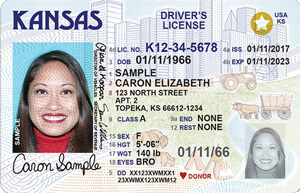- Updated for April 2025
- Based on official Kansas Driver's manual
Free Kansas DMV Permit Practice Test Three 2025
The key to developing great driving skills is no mystery, and there’s no better time than now to find the help you need. Dodge City has changed a bit since the days of Wyatt Earp, but you still must obey its laws. If you are seeking a Kansas learner’s permit, you will be required to demonstrate your knowledge of road rules and safe driving practices. While there are various on-line resources offering to help you, there is only one that provides complete instruction.
Although you must meet several requirements to receive a learner’s permit, your ability to pass the official driver’s knowledge test is of the utmost importance. If you fail to answer 80% of the 25 questions correctly, you will need to give it another try. Our free Kansas DMV Permit Practice Test can provide you with the test-taking skills needed to avoid this hiccup. Don’t feel like it’s an impossible task! The most common problem with the official knowledge test is it can present complicated scenarios and confusingly worded questions. However, if you spend some study time with the practice test, the effect of these factors will be diminished.
While you may have used study guides in the past to prepare for important tests, the PermIt Practice Test is a more effective and time-efficient alternative. The practice test is based on the most recent Kansas DMV driver’s manual (Kansas DMV Handbook (KS Driver's Manual) 2025) and up to date as of April 2025. It includes 40 multiple-choice questions like the ones on the official knowledge test. These questions give you a way to check your readiness to pass the official knowledge test and fill your knowledge gaps. Study guides will help you memorize the answer to a question, but you’ll be on your own to find out the reason for it. If you submit an incorrect answer on the practice test, you will get a detailed explanation of the correct one. This information helps you build on your knowledge of road rules and driving safety. Don’t settle for getting partial information! The practice test will provide the most complete preparation for passing the official knowledge test and years of safe driving.
When your Garmin takes you off your planned route, get back on track with practice tests for other U.S. states and Washington D.C. at https://driving-tests.org/academy/drivers-license.
- Perfect for learner’s permit, driver’s license, and Senior Refresher Test
- Triple-checked for accuracy
What you need to know

What to expect on the actual KS DMV exam
questions
correct answers to pass
passing score
minimum age to apply
List of questions (classic view)
- A driver who wants to enter a highway from a private road
- When you turn off a high-speed, two-lane roadway, _________ if you have traffic following you.
- Shared center lanes that are marked on each side by a solid yellow line and a dashed yellow line are reserved for _________ and can be used by vehicles traveling in either direction.
- You must _______ for a school bus that is stopped with its red lights flashing on the opposite side of the road.
- You must maintain a constant speed when passing and reentering the lane in front of trucks or buses, since trucks and buses require
- You must keep your windshield wipers in good operating condition because
- If you are about to pass a bicycle to your right and an oncoming vehicle is approaching you on your left, what should you do?
- The large areas around trucks and other large vehicles where cars may disappear into blind spots are called
- Flag persons (flaggers) are often located on highways and in work zones
- What does this sign mean?
- Partial hydroplaning of a typical passenger car can start at speeds as low as
- Diagonal yellow stripes painted on some streets and highways indicate
- What does this sign mean?
- You should never drive alongside a motorcycle in the same lane because
- A "Speed Zone Ahead" sign means that you are approaching
- Rear-end collisions are common on highways because many drivers
- Vertical rectangular signs with black letters on a white background are used as
- If there is not enough room to make a U-turn, you can turn your vehicle around by making
- In which of the following situations are you allowed to pass another vehicle on the right?
- A double solid white line marks the edge of a traffic lane where
- When there is water on the roadway, you must reduce your speed to avoid
- When passing a large vehicle, do not merge back in front of the vehicle until you can see its
- A single broken yellow line usually marks the centerline of a two-way roadway where
- A broken yellow line alongside a solid yellow line indicates that
- If you are being passed by another vehicle, you should
- This sign is posted
- To avoid last-minute braking or the need to turn suddenly, you should _____ while driving in the city.
- When turning left from a one-way road onto another one-way road,
- A roundabout is a circular intersection in which vehicles travel around a central island in _________ direction.
- This sign indicates
- Which of the following are used as left-edge lines on divided highways?
- On two-lane roads where traffic moves in opposite directions, you may pass on the left only when
- When you are driving on freeways, the condition that makes you feel that you are going slower than your actual speed is known as
- If you approach an intersection at which the traffic lights are not working, you must first __________ before entering the intersection and then yield the right-of-way.
- You have entered the intersection to turn left. If you encounter a steady yellow arrow signal, you must
- On a highway, use the left lane for
- Work zone or construction zone signs have
- On an expressway, you can avoid highway hypnosis by
- On a highway with three or more lanes in each direction, fast-moving vehicles should use
- What does this sign mean?
More resources
- Alabama: Test 1 / Test 2
- Alaska: Test 1 / Test 2
- Arizona: Test 1 / Test 2
- Arkansas: Test 1 / Test 2
- California: Test 1 / Test 2
- Colorado: Test 1 / Test 2
- Connecticut: Test 1 / Test 2
- Delaware: Test 1 / Test 2
- District of Columbia: Test 1 / Test 2
- Florida: Test 1 / Test 2
- Georgia: Test 1 / Test 2
- Hawaii: Test 1 / Test 2
- Idaho: Test 1 / Test 2
- Illinois: Test 1 / Test 2
- Indiana: Test 1 / Test 2
- Iowa: Test 1 / Test 2
- Kansas: Test 1 / Test 2
- Kentucky: Test 1 / Test 2
- Louisiana: Test 1 / Test 2
- Maine: Test 1 / Test 2
- Maryland: Test 1 / Test 2
- Massachusetts: Test 1 / Test 2
- Michigan: Test 1 / Test 2
- Minnesota: Test 1 / Test 2
- Mississippi: Test 1 / Test 2
- Missouri: Test 1 / Test 2
- Montana: Test 1 / Test 2
- Nebraska: Test 1 / Test 2
- Nevada: Test 1 / Test 2
- New Hampshire: Test 1 / Test 2
- New Jersey: Test 1 / Test 2
- New Mexico: Test 1 / Test 2
- New York: Test 1 / Test 2
- North Carolina: Test 1 / Test 2
- North Dakota: Test 1 / Test 2
- Ohio: Test 1 / Test 2
- Oklahoma: Test 1 / Test 2
- Oregon: Test 1 / Test 2
- Pennsylvania: Test 1 / Test 2
- Rhode Island: Test 1 / Test 2
- South Carolina: Test 1 / Test 2
- South Dakota: Test 1 / Test 2
- Tennessee: Test 1 / Test 2
- Texas: Test 1 / Test 2
- Utah: Test 1 / Test 2
- Vermont: Test 1 / Test 2
- Virginia: Test 1 / Test 2
- Washington: Test 1 / Test 2
- West Virginia: Test 1 / Test 2
- Wisconsin: Test 1 / Test 2
- Wyoming: Test 1 / Test 2
Your go-to, trusted source
Experience the Driving-Tests differenceOur commitment to accuracy and quality in our practice tests
Explore our rigorous, multi-tiered verification process that ensures each question mirrors the official manual for unparalleled accuracy.

At Driving-Tests.org, we understand the importance of reliable and accurate practice tests to help you prepare for your DMV exam. That's why we've developed a meticulous process to create and continually update our practice questions, ensuring they reflect the most current driving laws and regulations.
Here's an inside look at how we maintain the highest quality in our practice tests.
Content Creation and Verification Process
- Alignment with Official Manuals:
Every question we develop is based on the most recent version of each state's official driving manual. Our team regularly monitors each state DMV's website for the latest updates to ensure our practice tests are always aligned with the most current information. - Community Feedback Integration:
We leverage feedback from our vast community of users to understand which topics are most frequently tested. This helps us focus on the areas that are most relevant and beneficial for your preparation. - Expert Content Creation:
Our in-house editor, Steven, who has extensive experience in driver education, crafts each question with precision. He conducts a thorough review of each question against the official manuals to ensure accuracy. - Rigorous Review Process:
Once Steven has finalized a set of questions, our team conducts a joint review session. This second level of scrutiny involves content accuracy, proofreading, and fact-checking to eliminate any errors. - User Feedback Mechanism:
After a question goes live on our site, we keep the lines of communication open. Each question features a feedback button, inviting users to report any issues or errors. This continuous feedback loop allows us to address and rectify any concerns promptly. - Responsive Updates:
In line with our commitment to accuracy, we quickly update our practice questions to reflect any changes in the DMV manuals. Additionally, we update the free electronic copy of the state's driver's license manuals on our site, typically within a few days after the DMV publishes them.
Our thorough quality control process ensures that you have access to practice tests that are as accurate and up-to-date as possible. We believe in the power of well-prepared drivers and are dedicated to providing you with the best study tools to help you succeed on your DMV exam.
Before you view your test results, discover how you can pass faster with Premium:
- Real Exam-Like Kansas QuestionsGet 650+ questions seen on the real test
- Money-Back GuaranteeIf you don't pass, it costs you nothing
- 97% Premium Users Pass on Their First TryCompare with the average US passing rate of 49%





Trusted by 1.15 Million drivers
